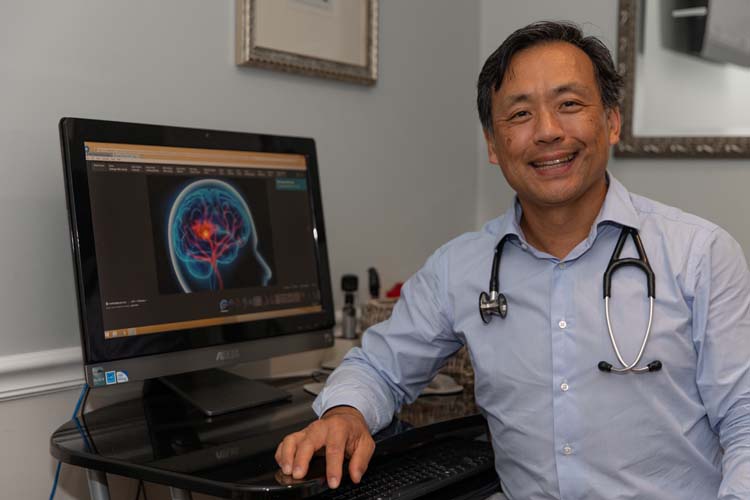
It’s long been known that sleep can be elusive for people who’ve had a stroke. According to the National Stroke Association, more than half of stroke survivors experience sleep problems – including insomnia – which can delay recovery, impede cognitive function, worsen memory problems and ultimately lead to depression.
But exactly what happens in people’s brains during their post-stroke recovery has been a bit of a mystery.
Recently, in a first-of-its-kind study, researchers from Europe set out to change that. Using sophisticated testing techniques, they compared the brain signals of people 12 months after they had a stroke with the brain activity of people in the general population.
Dr. John Suen is the Medical Director of Sleep Disorders Center Florida, located in Vero Beach. He is familiar with the study and says it is useful, particularly because the research was conducted a full year after the stroke occurred. “That’s important, as it suggests that sleeping problems are caused by other factors in addition to the stroke itself. This observation offers greater opportunities to provide help.”
Participating in the study were 21 people who had had a stroke at least 12 months earlier, and 21 healthy volunteers, who were matched to the stroke victims by gender and age. The participants spent two nights and one day in a sleep lab, where the researchers conducted a polysomnogram test to assess the brain’s sleeping patterns.
It was discovered that it took those who had a stroke longer to fall asleep than the volunteers, and that they also had poorer “sleep efficiency” – the ratio of time spent asleep compared to the time spent in bed.
Importantly, the team found that while sleep efficiency was poorer in those who had a stroke, total sleep time between the groups was similar. This mean it’s unlikely that lesions (abnormal tissue) in the brains’ centers for sleep-wake regulation are the cause of post-stroke sleep problems; rather, the researchers (and Vero’s Dr. Suen) believe those problems are due to a number of contributing factors, including pain and discomfort, greater psychological strain and reduced levels of physical activity.
The research team was from the University of Surrey in the U.K., the University of Freiburg in Germany, and the University of Bern in Switzerland. The study was published in the journal Scientific Reports in May 2018.
The researchers also recorded participants’ brain activity during the day using a multiple sleep latency test (MSLT) which measures the time from the start of a daytime nap period to the first signs of sleep. The results showed that those who had had a stroke were less likely than the healthy volunteers to nap or fall asleep during the day to compensate for lost sleep at night, and were also more likely to achieve poorer results on the “psychomotor vigilance test,” suggesting increased daytime impairment due to sleep problems.
The psychomotor vigilance test is a tool used to measure a person’s behavioral alertness. It involves measuring the speed at which a person reacts to visual stimuli. Poor results can increase the risk of cognitive lapses and even falls. A simplified version of the test – not intended to be a clinical assessment – can be found on Sleep Disorders Center Florida’s website @ www.sleepdisordersflorida.com.
The research team’s bottom line, and Dr. Suen agrees, is that treatment of sleep disorders should be routinely included in stroke rehabilitation practices. Unfortunately, that is not currently common practice.
Dr. Suen says “it begins with people recovering from a stroke taking extra care to have good sleep hygiene. If they still have problems falling asleep or staying asleep, they should seek treatment from a healthcare professional who specializes in sleep medicine.”
A few tips for good sleep hygiene:
- Go to sleep and wake up at the same time each day.
- Don’t take more than one nap a day, and keep it short.
- Create a pleasant sleeping environment; make your bedroom cool, dark, and comfortable.
- Exercise moderation in consuming alcohol.
- Use a sound machine, or other type of white noise, to block out unwanted noise.
- Do not watch TV or use the computer in bed. This is the most important tip, according to Dr. Suen. “Our eyes are connected by the optic nerve to the part of the brain that regulates our internal sleep clock. The light from these sources acts as a potent stimulus.”
Dr. Suen is board-certified in Sleep Medicine, Pulmonary Disease, Internal Medicine and Critical Care Medicine. Sleep Disorders Center Florida is an accredited medical treatment center for all sleep-related issues. It is located at 3735 11th Circle #103 in Vero Beach; the phone number is 772-563-2910.



